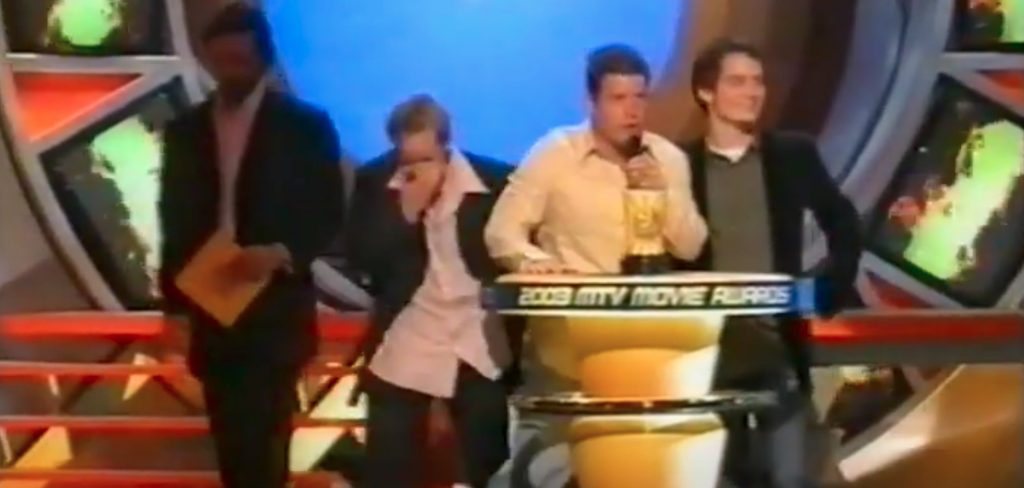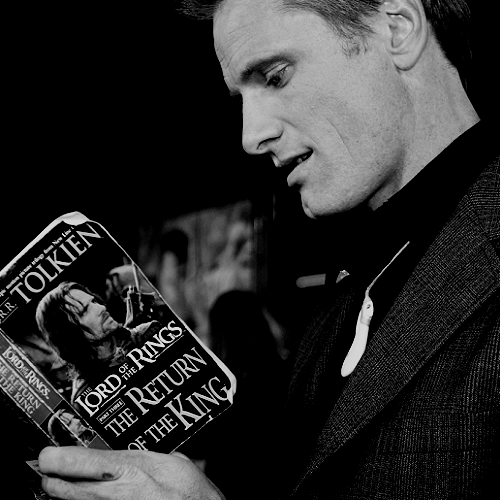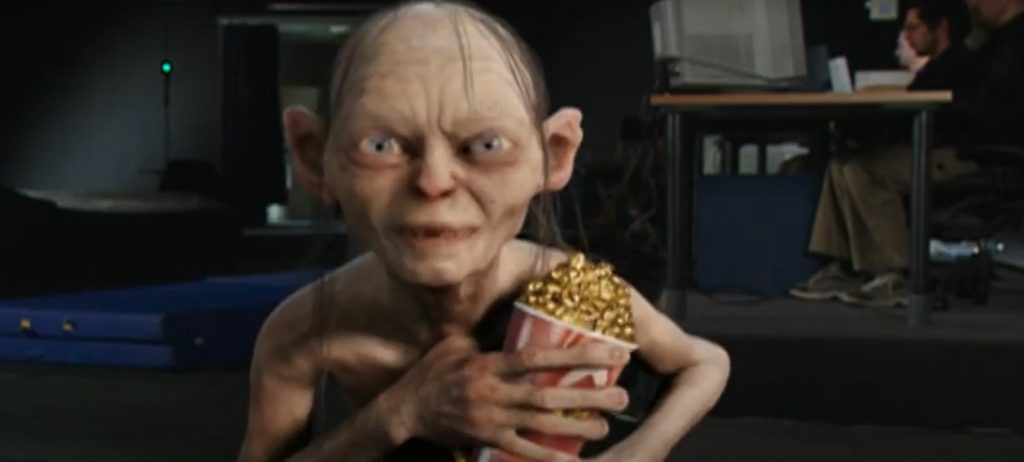We’ve been digging through the Green Book archives a bit to find relevant articles discussing the ‘purity’ of Tolkien and his works. We came across this classic from Green Book author, Anwyn, where she addresses the questions that came out of watching the 2003 MTV Movie Awards. If you aren’t familiar with it…read on!

I admit it. I’m at a loss for a stunning literary topic, one that will provoke your emotions, stimulate your mind, and offer some insight into Tolkien’s life or works. I sat down this evening with my brain half fried, knowing that I had a deadline to meet, and started flipping channels. Lo and behold, what did I pass but the MTV Movie Awards, and hark, who should be sitting behind Kirsten Dunst but the intrepid trio of Sean Astin, Elijah Wood, and Billy Boyd? Moreover, what award should they be announcing at that very moment but the award for “Best Movie?” I stayed to watch, having not bothered the first time they ran it.
I admit it. My finger is not on the pulse, as they say, of the pop-culture acclaim the Lord of the Rings movie phenomenon has generated and continues to stoke. I have not followed marketing trends; I couldn’t tell my father what TTT had grossed at the box office when he asked. I know, in a general way, that these films are wildly popular beyond the book’s fan base, that the movies have started their own fire that, due to the modern climate, burns higher than the literary one created when Tolkien was still living. What I don’t know is whether or not that’s a good thing.
The intro was cute. Keanu Reeves was charming. And the winner is … The Lord of the Rings: The Two Towers. Elijah, Billy and Sean, looking MTV cool in untucked, unbuttoned shirts, bounded up on stage, where Sean apologized for Gollum’s previous tirade. “That dude is out of control!”
I admit it. I didn’t watch TORn’s clip of Gollum’s “acceptance speech.” I read a transcript and was horrified enough that I had no desire to watch it. Why? you ask. It was funny! you say. Perhaps. But the issue, in my mind, was not whether or not it was funny, but the fact that Tolkien is barrel-rolling in his grave at having one of his characters co-opted into speaking such filth. Puritan, you remark. Perhaps. “Purist” would be closer to the mark, I think. The hallmark of Tolkien’s work is the very purity of his language, and to find the most vile of modern insults coming out of the mouth of a digitally created Gollum disgusted me and, I think, would have appalled and disgusted Tolkien.
The boyishly handsome trio accepted the award on behalf of the production and left the stage. I came to my computer wondering. This new popularity: good or bad?
There is no need to speculate about what Tolkien himself would have thought. Though the popularity of his books, in his day, was smaller in scope and lesser in frantic, frenzied intensity than that we are observing now in response to the movies, he still had to fend off a wave of targeted questioning and obsession with minutiae, causing him to make remarks about his “deplorable cultus” and the dangers of becoming involved in the stories “in a way I’m not.” That tendency is more alive and well than ever today, thanks partly to the very wonderful establishment with which I am connected and others like it on the internet. “Fan fiction,” which I assume to have existed before the web but which certainly has suffered an unbelievable popularity explosion since, with access to an immediate and free forum, proves this in and of itself, as do the myriad questions we get at Green Books every day.
My colleague Quickbeam and many others have come down to the baseline opinion that if it encourages people to read Tolkien, then the indignities that come with the Hollywood marketing machine are well endured. But arepeople reading Tolkien as a result of all this hype? The evidence that I see is mixed.

We get many letters at GB that include notes like “I am now reading the books to my [sons, daughters, nephews, nieces, grandchildren], and they LOVE them. They would never have been interested in them before the movie.” That’s wonderful, and of course I couldn’t be anything but pleased. But we get a greater number of notes, questions for the Q&A, that clearly show that their authors have not read and have no desire to read—only to know more about the world that their current idols [insert Elijah, Orlando, Billy, Dominic, Sean, Sean, or Viggo here] inhabit in these films. “Who is Aragorn and where did he come from?” “Who are Legolas’s parents? Does he ever fall in love? Is it true that he dies in the third movie?” and my personal favorite, “Can you give me a complete history of Elrond? Who is he, where did he come from, who are his parents, what is his significance?” Don’t tell me that these folks have any intention of reading—this stuff could be readily found if they’d ever even cracked a book.
So if people are not reading, what’s the fuss about? Special effects, swordplay, hot guys, and hot chicks, apparently. Again I hear that scraping, swishing sound … Tolkien is rolling.
I am not intending any commentary here on Jackson’s films themselves. My opinions on that score are well documented elsewhere. My concern is with the ultramodern hype that has followed.
I admit it. There’s not much reason to care whether or not the marketing machine runs at full efficiency and creates these millions of screaming Orli drones. After all, what does it hurt Tolkien’s books or my enjoyment of them? From one perspective, it doesn’t hurt one iota. From another perspective, it hurts to see characters that I regarded as the highest of the high, the pinnacle of heroic epic, degenerated into pop-culture icons. And it is not so with some of my other favorites. Anne of Green Gables, Elinor and Marianne Dashwood of Sense and Sensibility, and others have all been brought with sensitivity and grace to the big screen. And sensitivity and grace are not lacking in the majority of Jackson’s characterizations, either. So the difference must lie in the public reaction to them and to the supposedly clever accolades, like Gollum’s fling at the MTV awards, that follow.

Forgive me, dear readers, if I am indulging in a ramble without a point. This musing is simply part of a bigger question—how healthy is all this fandom, anyway? “Frenzy and intensity,” I said above to describe the modern fanboy and fangirl machines, and it’s true. The nearness of people to one another through the media and internet allows them to mass-embrace one concept in a way they never could have done a century ago. Is this healthy for our individual and collective minds and spirits? The screaming, the shoving for a picture or an autograph … I digress. Those are issues connected with all popular Hollywooders, not with Lord of the Rings alone, of course. And I guess that’s the crux of the matter—something formerly so exalted in the realm of literature alone has been brought to a level equal to that of the Backstreet Boys or Britney Spears. I guess that’s where the real rub lies. Like the rub of a tweed jacket upon the inside of a coffin. Tolkien is rolling.


